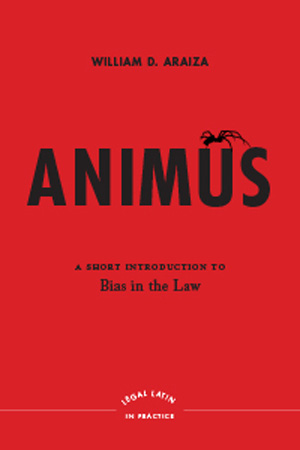
This book explores the concept of “animus” in the law of the Constitution’s Equal Protection Clause. Over the last thirty years, the Supreme Court has decided several important equal protection cases by concluding that the challenged government action was motivated by “animus.” Animus is a tricky concept in constitutional law. It has an everyday meaning, denoting action that is motivated by ill-will. But this common-sense meaning does not easily translate into equal protection law. Equal protection concerns itself with government action, and thus, action that is often institutional, rather than action taken by an individual whose subjective motivations can be examined.
The book constructs a constitutional theory of animus—that is, a theory that provides a workable approach by which courts can determine whether an action is based in animus. The first half of the book is mainly taken up with examining the Court’s most important statements about animus. The foundational case, from 1973, stated that “a bare … desire to harm a politically unpopular group cannot constitute a legitimate government interest.” That case, Department of Agriculture v. Moreno, struck down an amendment to the federal food stamp law that denied food stamps to unrelated groupings of persons living in the same household. The Court cited congresspersons’ statements that the amendment targeted “hippies” and “hippie communes” to conclude that the statute was, indeed, motivated by “a bare … desire to harm” such persons.
Starting a dozen years later, in 1985, the Court began building on Moreno’s statement as a justification to strike down laws ranging from a city’s rejection of a group home for the intellectually disabled to the federal government’s refusal, in the Defense of Marriage Act, to recognize same-sex marriages valid in the states where they were performed. While all of these cases relied on a conclusion that the challenged action was motivated by animus, and while all of them added to our understanding of the emerging animus doctrine, the Court has yet to unite these strands into a coherent whole.
The second part of the book attempts to create that doctrinal fabric. It explains how the strands of animus doctrine parallel another equal protection doctrine, one that governs how courts determine whether a government action was taken with “discriminatory intent.” The concepts of discriminatory intent and animus are analogous. As the book explains, it thus makes sense that the Court’s approach to discriminatory intent provides a template for its emerging animus doctrine. But even though the concepts are similar, they’re not identical. Thus, the book also explains how its proposed approach to uncovering animus differs from discriminatory intent doctrine.
After setting forth this approach, the book concludes by applying it to a variety of current equal protection issues, from gay rights to transgender rights to the rights of disabled people. It concludes by returning to a point the book makes in Chapter 1: namely, that the concept of “animus” is one with deep roots in American law that go back even before the Equal Protection Clause was drafted. Thus, it argues that our modern concern with animus is faithful to our deepest constitutional traditions.
My interest in animus grows out of scholars’ and courts’ impatience with conventional equal protection doctrine. Starting in the late 1960s and continuing until the mid-1980s, the Court experimented with an approach to equal protection known as political process theory. In brief, this theory argued that courts should give close scrutiny to equal protection claims only when the classification in question (e.g., a sex classification) impacted a group that was not able to fully defend its interests in the political process. The wisdom underlying political process theory is that courts were generally unqualified to judge the reasonableness of legislatures’ decisions that the public good was promoted by treating one group (e.g., trucking companies) differently from another (e.g., railroad companies). Political process theory argued that courts should focus their equal protection scrutiny on cases where the affected group was unable to effectively make its case in the legislative process. In such situations, theorists suggested, there was no reason to presume that the legislature was acting reasonably when they disadvantaged that group.
Political process theory underlay much of the Court’s thinking about equal protection in the 1970s and early 1980s. But eventually it petered out, as it encountered a series of difficult conceptual and practical roadblocks. It was just around that moment that the Court began using the animus concept. Indeed, a key case for animus doctrine, City of Cleburne v. Cleburne Living Center, was decided in 1985. Since Cleburne, the Court’s interest in animus has only increased. Indeed, animus lay directly or indirectly behind the series of equal protection victories gay rights advocates have won at the Supreme Court over the last two decades.
Thus, the animus concept has risen to a level of real importance at the Court. Nevertheless, the Court has never provided a satisfactory explanation of what animus means or how it is uncovered. Today, these questions are more important than ever. With the rise of cultural conflict and xenophobia, the prospect of government action undertaken for fundamentally bad reasons—essentially, to treat people unequally simply in order to oppress them—has grown. If the Court—and our constitutional law more generally—is going to be able to respond to the worst instances of such conduct, it will need conceptual tools. One of those tools has to be a more carefully thought-out animus doctrine.
If a just-browsing reader were to open the book I would like them to begin reading the Introduction. The Introduction seeks to explain why the animus concept is so important, but also why our common-sense understanding of the term is insufficient for purposes of constitutional law.
The Introduction is short. It begins with a simple (indeed, simplistic) set of three government actions that treat people unequally, and asks, Sesame Street-style, which of them is unlike the other two. The book provides the answer: one of those situations, a city council’s decision to deny a zoning variance to a proposed group home for intellectually disabled persons based on constituents’ dislike of those persons, is based in animus. Indeed, this situation reflects the facts of the City of Cleburne case that has played an important role in the development of animus doctrine.
Identifying this situation as one where the government action was motivated by animus provides an opening to the idea of animus. In particular, it will be intuitively obvious to many readers that the city’s action seems unconstitutional. In turn, that insight opens the door to realizing that the framers of the Constitution had a similar attitude. Framers such as Madison understood that groups of persons (what Madison referred to as “factions”) may hijack government for their own private ends—that is, to accomplish goals unrelated to the public good. Such conduct distantly, but distinctly, echoes the idea of animus. After all, as the book explains, animus essentially amounts to a government action to disadvantage a group for no legitimate reason.
With animus thus understood as an instinctive constitutional wrong, and as one that American constitutional law has always condemned, the question then becomes what the concept means. The Introduction explains that the intuitive understanding of animus as subjective bad intent doesn’t easily fit the context of government action. Government action is often institutional—the action of a legislature or an administrative agency, for example. Thus, it is difficult to translate into legal doctrine our intuitional understanding of animus as subjective bad intent. The book promises to provide an understanding of animus that is both workable as legal doctrine and faithful to the intuition readers had when they confronted the example of animus on the first page.
In sum, then, the Introduction identifies animus as an issue that Americans should care about, explains (briefly) why the issue is complex, and promises to create a doctrine that courts can use to guard against it. As such, I hope it hooks readers to come along on the book’s exploration of animus.
I have several hopes for this book. First, like most legal scholars, I hope to influence judges. Animus doctrine is quite important, but it’s seriously under-theorized. I hope that the book convinces judges that the Supreme Court’s previous animus cases have implicitly created a coherent animus doctrine that judges can use when deciding cases. The book attempts to reveal and illustrate that doctrine, and to present it in a way that judges can employ when deciding actual cases.
I also hope this book triggers more theoretical discussion among legal scholars about the future of equal protection law. Equal protection law today is adrift. As I said earlier, the Court has largely abandoned the political process theory approach. Nothing has replaced it. Animus doctrine can’t fill that hole completely. However, it can provide part of the solution. That part is an important one: the rise of xenophobia and cultural conflict (for example about sexual orientation and transgender identity) has raised the specter of government action motivated by simple dislike of particular persons—the core of the animus idea. Thus, a well-crafted animus doctrine can play an important role in the development of an approach to equal protection that responds to the issues prevalent in twenty-first century America.
Finally, and most generally, I hope the book triggers thought and discussion among legal experts, students, and educated laypersons, about what our constitution should mean. In writing this book I intentionally avoided overly-technical jargon and fine analytical distinctions, in favor of broad-brush analysis. Such technicalities have their place. But there is an important place for informed discussions between citizens about what their constitution means, and what it should mean.
Unfortunately, many Americans know little about fundamental constitutional concepts such as equal protection. This book attempts to introduce Americans to an important aspect of that concept, in a sophisticated yet accessible way. The issues to which animus doctrine responds are important ones in modern America. For that reason, Americans should be acquainted with, and feel able to discuss, ways our constitutional system can respond to those issue. One of those ways is through the animus doctrine. I hope this book contributes to Americans’ understandings of that idea, and stimulates critical thinking about it.


William D. Araiza is Vice Dean and Professor of Law at Brooklyn Law School. A graduate of Columbia University, Georgetown University and Yale Law School, Professor Araiza clerked after law school for the Honorable William Norris of the United States Court of Appeals for the Ninth Circuit and the Honorable David Souter of the United States Supreme Court. Professor Araiza is the author of numerous scholarly articles and books on constitutional and administrative law, and has written textbooks on Constitutional Law and First Amendment Law.